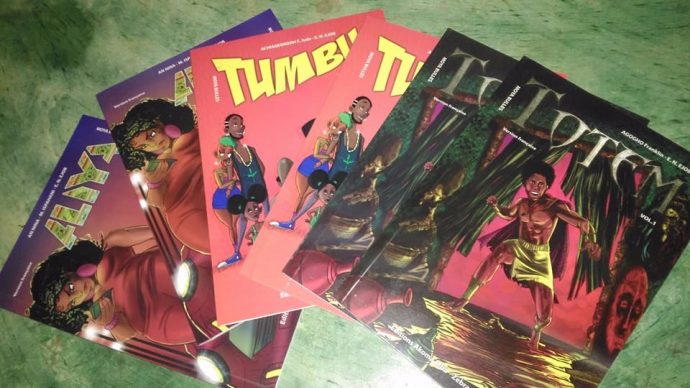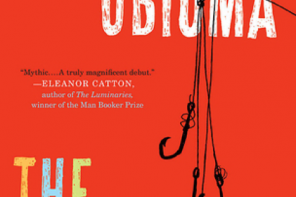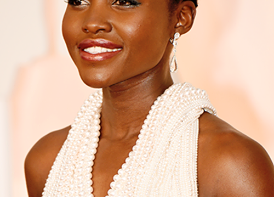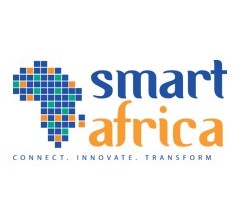Spider-Man, Wonder Woman, Batman and a protracted list of fictional superheroes, have all left an imprint in our lives, especially during our early years. Thanks to companies like Marvel and DC Comics, the alluring charm of these characters displayed and reinforced in heroic plots, continue to captivate and entertain both young and old admirers worldwide. Apart from the highly acclaimed fictional superhero known as Black panther, comic fans of African descent have had to settle for characters and storylines, which unfortunately, fail to represent the people and their heritage. This identity and cultural lapse in the comic industry has left many of such fans yearning for similar, but much more inclusive and relatable narratives. Instead of waiting for the gurus of the industry to quench this identity thirst, start-up companies like Zebra Comics Inc. have taken the bull by the horns in a bid to contribute to transforming this industry into an African jewel.
Before getting to know more about Zebra Comics it’s important to have an idea of how well the industry has been performing on the continent so far. Despite the financial backlash and limited support, the African comic industry has taken a big leap. Nigeria for instance is gradually gaining popularity as a haven for upcoming superheroes. In 2015, the Nigerian comic artist Roye Okupe released his first comic book known as: E X O – The Legend of Wale Williams, featuring an iron power-suited hero, set in a near-future Lagos of 2025. This marvellous creation didn’t fail to catch the eyes of the international media such as CNN, Forbes and Mashable. South Africa is equally very active in this area. Kwezi created by Lyiso Mkize, who also worked on the Supa Strikas comic series, narrates the adventurous life of an egoistic teenage boy who fuelled his new found superhuman abilities. Bayou-Aya created by an Ivorian writer who goes by the name Marguerite Abouet, might not be the typical superhero comic book with characters possessing supernatural powers, but it is acclaimed for its ability to draw out the superhero in ‘normal’ people by narrating reality tales of daily life in her home country Ivory Coast. Aya was created out of her desire to showcase Africans in a different and better light other than the negative images painted by the international media. The story has won several awards, and has also been adapted into a film. This earned Marguerite Abouet a place in the Top Black 25 Comic Book Writers ranked by CBR in 2016.
The African comic industry goes beyond books! The game developer Eyram Tawia and Commercial software developer Wesley Kirinya from Ghana and Kenya, respectively, went further in their contribution to rebranding the comic industry by creating the digital games True Ananse and Africa’s Legends, as well as mobile apps. Their technological ingenuity makes access to their content on Android, Windows Phone, Nokia and JAVA most convenient. Furthermore, the Cameroonian start-up Kiro’o Games, has been taking the industry by storm with its action role-playing video game known as: Aurion: Legacy of the Kori-Odan. Bringing in an entirely new and intriguing perspective of the what is generally known. Kiro’ Games contrary to mainstream fantasy games, ushers in the African hero Enzo Kori-Odan, ruler of Zama. Zama is a multicultural society that is suddenly being threatened by a coup, after successfully escaping the predatory claws of imperialism. Enzo Kori-Odan’s supernatural force known as the Aurion, comes from the collective energy of his ancestors. Speaking to CNN in 2016, its founder Madiba Olivier recalls, “At first, the idea was to make games about ninjas,” “But then I realized many gamers were bored of the same story and the same heroes. That’s how the idea to create an African fantasy came out. I wanted to break what I call ‘the exotic world’ image of Africa.” With the help of a Kickstarter crowdfunded campaign, Kiro’o Games has generated over $50,000 to create Cameroon’s first role-play game.
Now let’s talk Zebra Comics Inc.! This is a start-up specialized in the creation and commercialization of comic books. It was created in October 2014 in Buea (Cameroon), but operates today in the capital city of Cameroon (Yaoundé). This start-up is made up of a youthful team (21- 31 years) of eight Cameroonian writers and artists, who create and tell African stories with the use of illustrations in comic book format. “Given growing competition in the culture sector where western cultures dominate, we think it is necessary for Africans to know their own stories, to place more value on their culture and to develop a certain pride in their true identities. In this light, our stories are well researched and, even though they are fiction, they carry accurate representations of our African cultures. We intend to build a sense of pride in Africans and make them believe that they have value and they can do great things too”
IAM: How did it all begin?
The brain behind Zebra Comics Inc. is a Cameroonian writer, comic book artist and illustrator called EJOB Nathanael EJOB. As an avid lover of comic books, he was disturbed by the fact that there were very few comic books in Cameroon and those that existed where always from America, Europe or Asia. He also realized, that the African culture seemed to be losing value in African communities and so there was a need to reaffirm our uniqueness and the values of our culture. With this, he decided to create Zebra Comics Inc. to enable even the youngest readers to appreciate African culture and take full possession of their identities. And what better way to do so than to use images which stick in the mind for posterity?
Discover the Kiro’o games: the discovery of the African fantasy
IAM: Rebranding the comic industry is a daring and challenging task, that requires you to restructure the entire system from its innermost core which is, the story itself. Tell us more about the conception and processing of your stories?
Since we are dealing with fiction and in view of our strong cultural fundament, the writers are tasked with creating very interesting concepts and plots, but these concepts and plots need to be based on the African culture and need to pass across messages which educate deeply. Having said that, the stories must display high cultural relevance and uniqueness. After editing the script, it is forwarded to the artist for illustrations, who works in synergy with the writers. The graphic artists are also expected to illustrate in a way that accurately depicts the African culture. The characters, settings and even objects which they illustrate are indicative of what is or was found on the continent at the time in which the stories are set. If the story and illustrations meet up to these expectations, it is qualified for printing and eventual distribution. Although our stories are Afrocentric, we create interesting stories for comics book lovers of all ages in all countries around the world.
IAM: How many comic books have you published so far? and what type of fictional figures characterize Zebra Comics?
Zebra Comics Inc. has published three comic book titles so far namely ALIYA, TUMBU and TOTEM. Our comic books portray characters who come from the African continent and who represent our cultures, myths and ideals in a unique way which gives great value to the African people. Our main characters may possess certain qualities which differentiate them from regular characters, but our stories are not the typical superhero stories which you find in mainstream media. We try as much as possible to be realistic and inclusive, for example, our comic book titled ALIYA treats the strength of the African woman, as she struggles to assert herself as a valuable woman in a male dominated corporate world. Through her, we aim to inspire young girls and women to believe in themselves and strive to contribute at the same level as men to the development of our communities. TOTEM treats the theme of albinism which is still a kind of taboo in some parts of Africa. Through the journey and adventures of Akam an albino boy, the African religion, identity, culture, history and fantasy between the 11th and 14th century AD are rejuvenated once again. TUMBU (like the maggot) on the other hand, is a parody of the Cameroonian society (our day-to-day experiences in Cameroon). It can be likened to The Simpsons, the popular American animated series. Furthermore, we publish in English and French and the first issue of these individual comic book series will be published in March 2018. Sequels will follow quarterly. We have sold over 500 copies of our comic book magazine to readers in Yaoundé, Douala, Buea and Bamenda, Cameroon. Internationally, we have had reactions from people in the diaspora who have bought several digital copies of our comics on Amazon. The feedback has been good so far, with foreign artists requesting to work with us.
Also read Poetry in African languages
IAM: What does the future look like for Zebra Comics Inc.?
Zebra Comics Inc. will be getting into ventures like 2D and 3D animation, advertising, movies, video games, toys and exercise books. These are domains which are directly linked to the comic book industry, and which can help in rebranding Cameroon and Africa. Later this year, three graphic novels: NJOKU, EDEN and VIK will be released. Moreover, we hope to collaborate with other publishers from Nigeria. Nevertheless, we have had the chance to work with foreign publishers in the United States on comic books titles and graphic novels which will be released soon. We plan to set up a literary café in Yaoundé, Cameroon where people can visit, read comic books and play video games.
IAM: Starting up a company especially in a quite new industry in Africa is not easy. What challenges does Zebra Comics Inc. face? And what can be done to make the industry more appealing to the African audience?
The shortage of quality human resource! Creating comic books entails a lot of work, especially in terms of art and graphic design. Presently, given the work load we have, there is a huge shortage of quality human resource. Also, several young people lack the patience to learn, the resilience to persevere, the humility to accept criticism as well as the artistic quality needed to compete on an international scale. However, we hope to recruit the right talents through a recruitment campaign for comic book artists.
We need more education and sensitization! Comic books is a tool which can educate deeply since it makes use of images which cannot be easily forgotten. Zebra Comics Inc. plans to organize school tours to meet students and explain to them why comic books are important. Also, governments, local councils and other organizations should be able to create more libraries and reading opportunities for young people to acquire and read African comic books often. Many more festivals around books in general and comic books in particular, should be organised in Cameroon and on the African continent. These festivals give visibility to comic books and create interest through experiences, in ways which regular communication media cannot. Nevertheless, the public has been very receptive vis-à-vis our work and the people are beginning to gain more interest in the comic industry. On our social media platforms for instance, our followers are increasing every day.
Despite the efforts made so far, according to the online platform known as Medium, an industry expert survey in Nigeria places the percentage level of local content in awareness at 15–20%. This equally implies that only the percentage of Nigerians in the age group of 15-20 are aware of local comics, and tend to patronize them. The rest of the population are more familiar with foreign comic contents or do not recognize some of the local ones as such.
Nonetheless, already existing Start-ups like Zebra Comics Inc. continue to use African folklore and mythology to create a more relatable and enjoyable world for comic lovers around the world. The question of whether or not, the continent will continue to witness the birth and growth of such companies remains uncertain due to financial challenges, insufficient support and strong competition from comic moguls like Marvel, DC Comics etc. Notwithstanding these practicalities, there is a bright light on the horizon. In the words of Madiba Olivier to CNN, “We have spent the past ten years running from poverty. So, the next ten years? We’ll spend it running towards prosperity.” In other words, running towards the goal of transforming the comic industry into an African dream.





